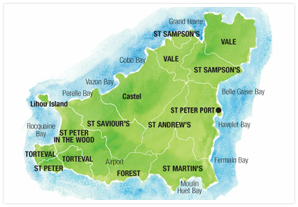offshore banking in Guernsey


Guernsey is the second largest of the Channel Islands and is a dependency of the British Crown. The capital and financial centre is St. Peter Port. Guernsey is associated with the European Union by virtue of the treaty of accession entered into by the United Kingdom.
The Guernsey Financial Services Commission is the statutory body, which regulates the financial services industry. In addition to the regulation of banking, insurance and fund management companies, there is a licensing system for businesses providing company formation and management services and trustee services. Guernsey is a major centre for captive insurance and offshore fund management activities.
In order to meet its international obligation to operate a tax regime, which treats both onshore and offshore companies in the same manner, Guernsey is in course of changing its tax regulations. The result will be the abolition of the Guernsey exempt company and it is planned to introduce a zero rate of tax for all companies, both offshore and onshore.
Guernsey Offshore Activities
For International Bodies, activities on the island must not involve transactions with Guernsey residents (except other International or Exempt Bodies), but are not otherwise specifically limited. For Exempt Companies, there is no specific bar against local activities; the more important factor is the whereabouts of the beneficial owners.
Exempt Investment Schemes must not invest in Guernsey, other than through bank deposits or through other Exempt Bodies.
Exempt Insurers are not limited as regards local activities, but must notify them to the Administrator.
In most cases of non-residence there are no specific rules about Guernsey activities; income is simply split according to its source and taxed or not accordingly.
Guernsey Forms of Offshore Operation
Offshore operations may take place within the following forms:
Non-Resident Foreign Company
Exempt Private Limited Company
Exempt Investment Scheme
Exempt Insurer
International Body
Branch
Trust
Guernsey Tax Treatment of Offshore Operations
See Domestic Corporate Taxes for the general principles of Guernsey corporate taxation, which also apply to offshore entities except as indicated below.
Offshore Guernsey entities are taxed as follows:
Non-Resident Foreign Companies (ie those not managed and controlled from Guernsey) will be charged with income tax at 20% only on income from Guernsey sources (other than bank interest, by concession); a Guernsey registered company cannot be non-resident - it is either resident or it is exempt or it is an International Body.
Exempt Private Limited Companies (Category D Bodies) pay a fee of GBP600 along with their annual application for exemption and also a fee of GBP100 payable when dealing with an Application for Exempt Status and filing the Annual Return (in duplicate). Generally they do not trade locally, but will pay income tax at 20% on local income if there is any (except bank interest, by concession).
Exempt Investment Schemes (Category A, B or C Bodies) pay a fee of £600 along with their annual application for exemption. Income tax at 20% is deducted from dividends paid to Guernsey investors, but there is no deduction from dividends paid to non-residents.
Exempt Insurers (Category E Bodies) pay a fee of GBP3,380 along with their annual application for exemption. Generally they do not trade locally, but will pay income tax at 20% on local income if there is any (except bank interest, by concession). Cells of Protected Cell Companies pay GBP1,100. Insurance managers pay according to the number of companies managed, from GBP3,000 for 1 - 10 companies, up to GBP10,000 for over 100 companies.
International Bodies (Companies or Partnerships) negotiate a rate of tax between nil and 30% (typically 2%) to be paid on their international income. An application is made to the Income Tax Authority, which considers eligibility, the nature of trading activities conducted, and the economic interests of Guernsey before issuing a certificate of International Tax Status, which is usually valid for 5 years at the specified rate. The intention is to help companies, particularly investment companies, conform to minimum tax requirements imposed by other jurisdictions.
Branches are subject to tax (income tax at 20%) only on income from Guernsey sources (other than bank interest, by concession).
Trusts with non-resident beneficiaries are taxed only on Guernsey-sourced income (other than bank interest, by concession), and the assessment is made on the trustee.
Trust management (Fiduciary) companies pay an application fee of GBP1,071 plus GBP107 for each entity managed; Personal Fiduciary Licences cost GBP536. Annual fees depend on the volume of trust business managed: GBP2,678 for up to GBP250,000; GBP5,356 for up to GBP1m; GBP13,000 for up to GBP2m; GBP15,080 thereafter.
Trust management (Fiduciary) companies pay an application fee of GBP1,125 plus GBP112.50 for each entity managed; Personal Fiduciary Licences cost GBP565. Annual fees depend on the volume of trust business managed: GBP2,810 for up to GBP250,000; GBP5,615 for up to GBP1m; GBP13,625 for up to GBP2m; GBP15,805 thereafter.
Non-resident partners in a Guernsey partnership or Limited Partnership are liable for tax only on Guernsey-derived income (with the usual concessions regarding bank interest), and then as individuals (see Personal Taxes).
Guernsey Taxation of Foreign Employees of Offshore Operations
This section refers to the taxation of foreign employees of non-resident operations and International Business Companies; see Domestic Personal Taxes for the general principles of individual taxation in Guernsey, which also apply to the resident employees of non-resident entities. There is in fact no distinction between the employees of resident or non-resident operations. It is a question of individual status. Most types of compensation and benefit paid to employees are taxable; there are no special privileges or exemptions for expatriate workers.
The Act provides for the licencing of international insurance companies, which are not permitted to operate domestically.
An individual is resident in Guernsey if he is on the island for a total of 182 days in the year of charge (the calendar year), or if he is on the island for a total of 182 days in the year to 31st July in the year of charge; and the use or possession of a dwelling-place usually leads to residence (the rules are complex). Resident means solely or principally resident. It is possible to be 'resident but not solely or principally resident' (essentially by not having a dwelling-place, but it's complicated); such an individual will pay Guernsey income tax on income sourced from or received in Guernsey (with exemptions for some sorts of local dividend, interest or royalty income).




